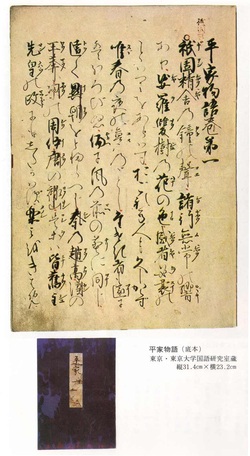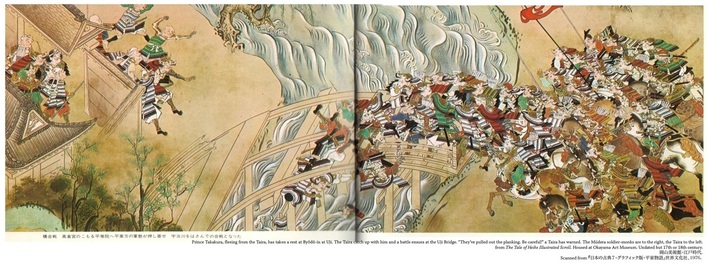Page one of the Heike Monogatari. Image courtesy of Prof. John Wallace
In my course, Swords of Salvation: Religion and Violence in Japan, we have been reading aloud sections of the "Tales of Heike". This wonderful text is Japan's most famous war epic, vividly depicting scenes from the Gempei War (1180-1185). It should properly be read aloud, as the tale was passed down through oral storytelling traditions for several hundred years before being written down.
The rhetoric of Heike Monogatari is heavily shaped by Buddhist thought, and it also offers an excellent description of how major Buddhist institutions existed in the late Heian period of Japan (794-1185). For example, it's opening lines are arguably the most famous in classical Japanese literature:
The sound of the Gion Shoja bells echoes the impermanence of all things; the color of the sala flowers reveals the truth that the prosperous must decline. The proud do not endure, they are like a dream on a spring night; the mighty fall at last, they are as dust before the wind. [translation by Helen Craig McCullough (1988)]
Indeed, these lessons of impermanence are reinforced knowing that the tale's greatest hero, Minamoto Yoshitsune, will eventually meet his own violent end.
This image depicts one of my favorite scenes from the epic, Chapter 4/section 11. Warrior monks from the Tendai temple Miidera fight alongside and against samurai at the famous "Battle of the Bridge" or the "First Battle at Uji" in 1180. The Minamoto faction tore up the wooden decking on the bridge to prevent calvary from crossing. As a result, the warriors must fight their way across the bare beams and joists over the Uji river which is flooded with summer monsoon rains.
This tale will lure in anyone who loves a romantic warrior tale, and it has inspired pop culture for centuries. GIve it a look. For those interested, U.C. Berkeley's Prof. John Wallace has created an excellent online resource for Heike study. I had the pleasure of exchanging emails with him this week, and he is a gentleman-scholar.
This tale will lure in anyone who loves a romantic warrior tale, and it has inspired pop culture for centuries. GIve it a look. For those interested, U.C. Berkeley's Prof. John Wallace has created an excellent online resource for Heike study. I had the pleasure of exchanging emails with him this week, and he is a gentleman-scholar.


 RSS Feed
RSS Feed
